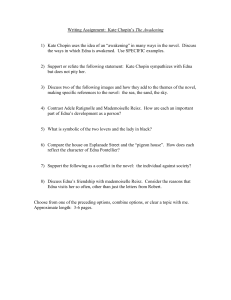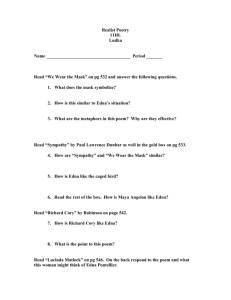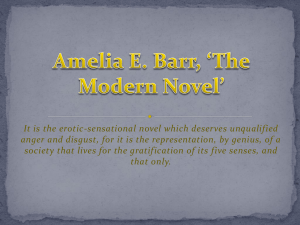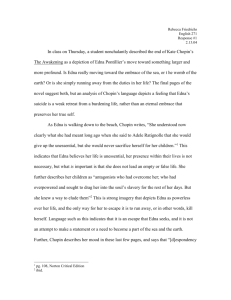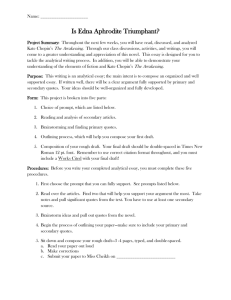Nancy Walker`s “Feminist or Naturalist?”
advertisement
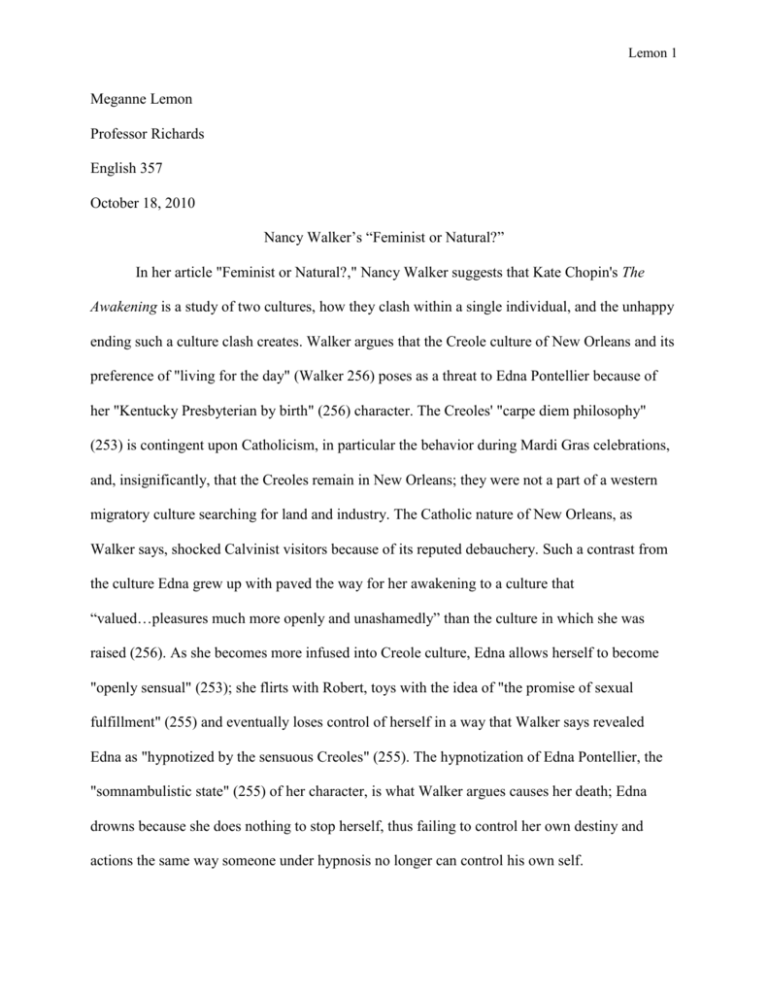
Lemon 1 Meganne Lemon Professor Richards English 357 October 18, 2010 Nancy Walker’s “Feminist or Natural?” In her article "Feminist or Natural?," Nancy Walker suggests that Kate Chopin's The Awakening is a study of two cultures, how they clash within a single individual, and the unhappy ending such a culture clash creates. Walker argues that the Creole culture of New Orleans and its preference of "living for the day" (Walker 256) poses as a threat to Edna Pontellier because of her "Kentucky Presbyterian by birth" (256) character. The Creoles' "carpe diem philosophy" (253) is contingent upon Catholicism, in particular the behavior during Mardi Gras celebrations, and, insignificantly, that the Creoles remain in New Orleans; they were not a part of a western migratory culture searching for land and industry. The Catholic nature of New Orleans, as Walker says, shocked Calvinist visitors because of its reputed debauchery. Such a contrast from the culture Edna grew up with paved the way for her awakening to a culture that “valued…pleasures much more openly and unashamedly” than the culture in which she was raised (256). As she becomes more infused into Creole culture, Edna allows herself to become "openly sensual" (253); she flirts with Robert, toys with the idea of "the promise of sexual fulfillment" (255) and eventually loses control of herself in a way that Walker says revealed Edna as "hypnotized by the sensuous Creoles" (255). The hypnotization of Edna Pontellier, the "somnambulistic state" (255) of her character, is what Walker argues causes her death; Edna drowns because she does nothing to stop herself, thus failing to control her own destiny and actions the same way someone under hypnosis no longer can control his own self. Lemon 2 Walker's thesis suggests that The Awakening is a novel that is naturalist, rather than feminist, and the character of Edna Pontellier "depends upon the Louisiana Creole setting" (252). By this assertion, Walker hints that she will discuss the naturalism of The Awakening. Instead, however, the majority of the text focuses on drawing comparisons and conclusions between Edna’s Presbyterian heritage and her Catholic Creole marriage. The discussion of naturalism is merely an afterthought in which the only naturalist aspect of the novel is Chopin’s perspective to show Edna with little control over her own destiny. Of course, Walker is careful to point out that when she uses the term “naturalist,” she means the “naturalist literary convention of her [Chopin’s] day” (252); the use of believable reality and the forces at work—the culture clash in New Orleans between the Catholic residents and Calvinist visitors—that create Edna’s character. But Walker strays from her determination to classify The Awakening as naturalist because she repeatedly points out the sensual, nearly surreal, language of the text, such as when Edna drowns. “The musky odor of pinks” (256) refers to the flowers in the meadow scene that Edna imagines but without the context as Chopin wrote it, one can only surmise a hallucinatory state or a case of synesthesia where Edna can smell colors. Furthermore, the confusing statement that Walker closes her essay with does not help the weak use of naturalism: “Perhaps those who read the novel as a feminist document are also affected by a clash of cultures: their own and that which the novelist inhibited” (256). By this statement, Walker suggests that the definition of naturalism is therefore the setting, the environment and society, that the author knows, manipulated by authorial intention; not the conventional literary style that the American Heritage Dictionary defines as “describing precisely the actual circumstances of human life.” 1 Chopin’s use of naturalism and Walker’s discussion of it is also a simple conclusion where Walker draws attention to the parallels between Edna’s inattention or apathy to Stephen Crane’s “The Open 1 The American Heritage College Dictionary. 4th. Boston, MA: Houghton Mifflin Harcourt, 2010. 927. Lemon 3 Boat,” but Walker fails at further explaining those parallels and how they would be considered naturalist (255). Despite the flaws in Walker’s essay, she presents a very strong argument in the cultural clash between the Catholics and Protestants in New Orleans that contributed to Edna’s loss of control, presenting an interesting speculation that it is the Creole “carpe diem philosophy” (253) that leads Edna to commit suicide. Walker highlights the differences between Catholic and Protestant culture, focusing largely on the sexualized differences. To represent Catholicism, she uses terminology like “a Southern Babylon” (252), “openly sensual” (253), and in describing Edna’s changed behavior: “like that of a new convert, her devotion to this way of life is often extreme” (256)—suggesting Edna’s transformation, or awakening, is quite radical. This kind of language, while somewhat extreme, supports Walker’s argument that such a culture divide can transform an individual into behaving in ways they would not normally otherwise behave. Walker further asserts her point by presenting juxtaposed images of Edna; a woman who is “selfcontained” (254), and so much self-contained that “even the simplest gestures of affection are foreign” (254), against a woman who “runs toward the promise of sexual fulfillment” (255), “gives little thought to the consequences” (256), and like the Creoles, began “living for the day” (256) by the novel’s conclusion. Walker concludes her strong argument by dramatically suggesting the Creoles’ laid-back, overly-sensual attitude enlightened Edna to take a swim when she did not plan to and ultimately contributed to her death because rather than trying to survive, Edna simply “realizes that she hasn’t the strength to swim back” (256), “drift[ing] into death” (256) very much the same way Robert “gentlemanly” ( 255) drifted out of her life.
